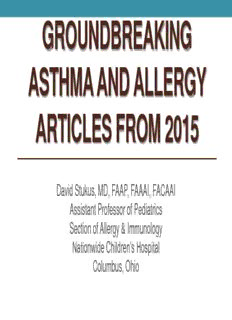
Groundbreaking Asthma and Allergy Articles from 2015 PDF
Preview Groundbreaking Asthma and Allergy Articles from 2015
GROUNDBREAKING ASTHMA AND ALLERGY ARTICLES FROM 2015 David Stukus, MD, FAAP, FAAAI, FACAAI Assistant Professor of Pediatrics Section of Allergy & Immunology Nationwide Children’s Hospital Columbus, Ohio Disclosures • I have no relevant financial relationships with the manufacturers(s) of any commercial products(s) and/or provider of commercial services discussed in this CME activity. • I do not intend to discuss an unapproved/investigative use of a commercial product/device in my presentation. Objectives • Understand the role of early introduction of peanut in prevention of peanut allergy • Recommend therapy for toddlers with recurrent wheezing through an individualized approach • Utilize food allergen IgE tests appropriately and interpret within clinical history Poll # 1 • At what age do you recommend parents introduce age appropriate peanut containing foods to their children? • 4-6 months • 6-9 months • 9-12 months • 2 years old • 3 years old The LEAP Study Food Introduction - Background 2000 Recommendations from American Academy of Pediatrics • Delay introduction of solid foods until 4-6 mos • Use hypo-allergenic formula for at risk infants • Introduce whole cow’s milk at 12 mos • Avoid eggs until 2 years of age • Avoid peanuts, tree nuts, fish until 3 years of age • Mothers of at-risk infants should avoid consumption of peanuts during pregnancy and while breast feeding (Based on few studies with various limitations) 2008 vs 2000 AAP Recommendations Intervention 2008 2000 Define ‘high risk’ Parent or sibling with atopy Both parents or 1 parent and sibling Avoidance of foods during Lack of evidence Possibly peanut pregnancy Exclusive breast feeding until Evidence for 3-4 mos 6 months Avoidance of foods during Some evidence for reduced atopic Peanuts, tree nuts and consider lactation dermatitis egg, milk, fish and “other foods” Prevention formulas Certain hydrosylates may delay “Hypoallergenic” formulas, not soy onset compared with cow’s milk based, not soy Types of solid foods Evidence to wait until 4-6 mos; no No solids until 6 mos, milk til 1 yr, evidence for specific foods egg til 2 yrs, peanuts, nuts, fish til 3 yrs What’s the Deal with Peanuts? • Prevalence of food allergy has doubled in past decade • Food allergy: • Overall, affects 5-8% of children • Peanut allergy ~1% • 2008 Study: Prevalence of peanut allergy in Israeli children 10-fold less than in United Kingdom • Adjusted Risk Ratio: 9.8 (95% CI, 3.1-30.5) • Median monthly consumption of peanut in infants 8-14 months old • Israel = 7.1 grams • UK = 0 grams Du Toit G, et al. J Allergy Clin Immunol. 2008 Nov;122(5):984-91 Learning about Early Introduction of Peanuts (LEAP) Study • Protocol: • Infants 4-11 months of age • Moderate-to-severe eczema and/or egg allergy • All underwent skin prick test (SPT) and in office challenge • Randomized to two groups: • Consume 2 grams peanut 3 days/week until age 5 • Peanut avoidance • Follow up oral challenge at 5 years of age Du Toit G, et al. N Engl J Med. 2015 Feb 26;372(9):803-13. LEAP Study Outcomes • Primary outcome • Proportion of participants with peanut allergy at 60 months of age determined by oral food challenge • Secondary outcomes • Skin prick size • Various immunologic parameters • Safety
Description: